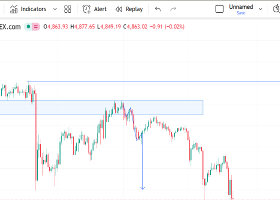
Trade the US Presidential Election 2016: Effects on Forex market and reactions.
The 8th of November is the day that US citizens will be called to decide who will lead their country over the next four years. The latest opinion polls show that the gap between the two major candidates has narrowed considerably in recent days, which has helped to heighten uncertainty over the actual outcome. Understandably, investors are growing increasingly anxious over who will win, as the Republican and Democratic nominees differ vastly on the policies that they would like to implement in the world’s largest economy. With just a few days until Election Day, and with politics overshadowing economics, market participants are eager to find out what the future holds under each presidency.
How is the US election process different from other nations?
The US Presidential election process is an indirect one, meaning that the president is not chosen directly by the people. Yes, the American people do go out on Election Day and vote for the President of their choice. But everything is based on a system called the Electoral College, and a group of people called “electors”, who choose the President. When citizens vote for their preferred candidate, they're actually voting for these electors. Each party picks its own electors, who are usually elected officials or party leaders. There are 538 electors in total, implying that 270 votes are needed for a candidate to win. Each state gets a certain number of these electors based on the size of its population. Therefore, states with bigger populations are usually critical to who wins the Presidency. The key part here is that at the state level, it is a winner-takes-all system. This means that whoever takes the most votes in each state, becomes the candidate that state supports, and thus takes all the votes from that state. For example, if a state is allocated 30 electors (out of the total 538), and 16 out of those 30 vote for one candidate, he or she will take all 30 electoral votes.
One of the President’s primary functions is proposing a budget about how to allocate the government’s funds, which needs to be approved by Congress thereafter. He or she can also propose legislation to Congress, as well as veto legislation. Perhaps most importantly, the President can issue Executive Orders, which are considered as law and do not necessarily require Congressional approval. So in essence, the President needs support from lawmakers to enact economic policies, but can act almost unilaterally on many other subjects, including foreign policy. The President also holds the power to appoint federal officials, subject to Senate confirmation.
Who are the main candidates?
Republican nominee: Donald Trump, a businessman and real estate developer.
Democratic nominee: Hillary Clinton, former US Secretary of State and former First Lady.
Differences between the two candidates
Monetary policy
Trump: A Trump presidency will likely see Fed Chair Yellen replaced when her term ends in 2018. Her replacement would probably be someone more hawkish on monetary policy, as Trump has recently been a vocal critic of low interest rate policies and how they are harmful to the economy. Something like that would cast doubts on whether the Fed is truly independent, possibly damaging the credibility of the institution. That would be a sign of instability for international investors. It could mean that every time a president is elected, he or she can directly intervene in monetary policy decisions by replacing key Fed officials. This is precisely the reason why central banks around the world are independent and why Fed Governors have set terms that will often outlast presidential terms.Clinton: On the other hand, a Clinton presidency could have little effect on monetary policy. Yellen was appointed by Obama, with whom Clinton shares a lot of her policies. This suggests that Clinton is unlikely to replace Yellen. This argument is enhanced by the fact that Clinton has not commented on monetary policy, implying she is unlikely to seek changes to the status quo.
However, as mentioned above a President requires approval from the Senate to appoint Federal officials, implying that even Trump as a President may not be able to influence Fed policies as much as he would hope.
Fiscal policy
Trump: Donald Trump has called for very expansionary fiscal policy. He has been a strong advocate of slashing taxes significantly (particularly corporation tax), as well as dramatically increasing public spending, primarily on infrastructure. In the end, he may not actually follow through with many of his proposals as they also need approval from Congress. However, in case that he does manage to push them through, US public debt could quickly balloon through a combination of lower taxes and increased spending.Clinton: A Clinton administration would likely be more moderate with public finances. While the Democratic nominee has also advocated for increased spending on infrastructure and other areas of the economy, she has also called for raising taxes on very high-income individuals. Her overall fiscal stance is likely to be a continuation, but slightly more expansionary, than Obama’s. One key point to note here is that Congress is controlled by Republicans, implying that Clinton may have a more difficult time than Trump pushing her policies through as things currently stand. However, the majority in Congress could change soon, as there are Congressional elections on November the 8th as well.
Trade policy
Trump: The Republican nominee has repeatedly called for increased protectionism. One of the key themes of his campaign has been renegotiating “disastrous trade deals” such as NAFTA, which according to Trump have led to many US jobs being lost to foreign workers. If it is not possible to renegotiate them, he advocates to abandon them altogether. The implications of that would likely include a shift of global trade policy towards more protectionism, as the US has been a strong advocate of free trade in recent decades. Such a major shift in policy from the world’s biggest economy could push other countries to adopt similar policies, thereby running the risk of initiating trade wars across the globe.Clinton: The Democratic nominee has been somewhat more ambiguous on her trade policies. She was previously seen as an advocate of free trade, but the content of her recent speeches with regards to trade policies points to a shift to a more protectionist stance as well (but to a much lesser degree than Trump). On balance, given their current positions on this subject, it seems likely that whoever ends up winning the presidency, the US will likely shift to a more protectionist stance.
What does each candidate’s victory imply for financial markets?
It’s quite hard to predict how the financial world will respond to a presidential race like we’ve never seen before. The two major candidates appear unique compared to what we are used to, and this is proven by the headlines that marked this race, such as FBI investigations, as well as some of their extreme political positions, like building a wall at the Mexican border. However, based on how markets have reacted so far to developments with regards to this race, and especially the first presidential debate, we believe that a Trump win could lead to an environment of risk aversion across markets, mainly due to the heightened uncertainty surrounding his policies. On the contrary, a Clinton win may signal the continuation of the current political status quo, given that her policies are more or less similar to Obama’s. Thus, her victory could largely have the opposite effects across asset classes. Let’s examine the expected effects in individual markets:
FOREX
Trump: The biggest reaction in FX markets from a Trump victory would probably be felt in the currencies of the countries with the biggest trade exposure to the US economy, given his protectionist views. The prime example here is the Mexican Peso, which has been dubbed as the barometer of this race given Trump’s tough stance towards Mexico. At the moment, the 1-week implied volatility of USD/MXN has surged the most compared to other currency pairs that can be affected by the election result. We expect MXN to collapse in case he wins, as investors start speculating that NAFTA may be renegotiated, or even scrapped altogether. The Canadian dollar may also come under selling pressure, but possibly to a much lesser extent than the peso.
What’s more, given our expectations for a risk-off environment should Trump win, we believe that pro-risk commodity currencies such as AUD and NZD could come under selling pressure, while safe havens like the JPY and CHF may rally further.
Clinton: Since we expect a Clinton win to lead to a risk-on atmosphere across FX markets, commodity currencies like AUD and NZD could gain, as investors price-out the risk of heightened protectionism across the globe. The MXN and CAD are likely to experience a relief rally as well. Meanwhile, safe haven currencies are likely to erase some of their recent gains.
What about USD: In our view, the reaction in the dollar remains ambiguous. Market chatter suggests that a Trump victory will be negative for the dollar, but we are not so sure. Indeed, the greenback has lost ground as Trump gained momentum in the polls the last few days. However, that may not be a sign of negative correlation between Trump and the dollar, but rather a sign of increasing uncertainty. The closing gap in the poll battle makes the outcome even more uncertain as the voting day draws closer, and uncertainty isn’t something that institutional investors like. Also, if we recall investors’ reaction after the first debate when Clinton was seen as the winner, a risk-on sentiment dominated the markets, but the dollar remained largely indifferent, supporting our view.
Equities
Trump: A Trump win is likely to prove negative for US equity indices overall, due to the uncertainty surrounding most of his policies. With regards to specific sectors within equity markets though, there are some examples that could profit due to his unique policies. Such examples include industrials, metals, utilities and energy. We believe that these sectors are likely to benefit, given his focus on increased infrastructure spending, rebuilding the military and rolling back energy regulations that he claims are helping the environment but hurting the economy.
Clinton: Likely to prove positive for US stocks in general, as investors become more certain that the status quo will continue with regards to government policies. She did show some preference over renewable energies, implying that oil-related stocks may lose if Clinton gets elected. The fact that she is unlikely to seek to replace Yellen as Fed Chair also adds to the picture for stability, and is a positive for equities.
CommoditiesTrump: Precious metals, such as gold and silver, are likely to rally initially in the risk-off environment that results. Oil prices could rally as well, because as mentioned above Trump is considered to be pro-oil, vowing to eliminate some environmentally-friendly regulations in order to boost the economy.
Clinton: Safe haven precious metals could come under selling pressure, as investors turn to riskier assets like stocks and political uncertainty moderates.
Conclusion
We conclude that the main difference between the two candidates in terms of market action is that a Trump win may be the trigger for a risk-off environment, mainly due the uncertainty associated with his policies. In the same logic, a Clinton victory may lead to a risk-on situation across markets, as she represents the continuation of the current state of political affairs.
Even though market pricing still implies that Clinton is overwhelmingly likely to win (67.6% probability at the time of writing according to FiveThirtyEight), opinion polls suggest that the race is almost too-close-to-call. We share this view, and we believe that given how close the poll battle is at the moment, markets are likely to become increasingly more sensitive to fresh polls as we approach Election Day. If Trump continues to gain momentum and closes the gap between him and Clinton further, or even gains a lead, we are likely to see all the aforementioned market reactions gradually coming into play even before the actual vote takes place.
Clinton wins: USD/JPY, USD/CHF UP; EUR/USD, GBP/USD, AUD/USD, NZD/USD UP.
Trump wins: USD/JPY, USD/CHF Down; EUR/USD, GBP/USD, AUD/USD, NZD/USD Down.


